16+ Sample Outsourcing Agreements
-
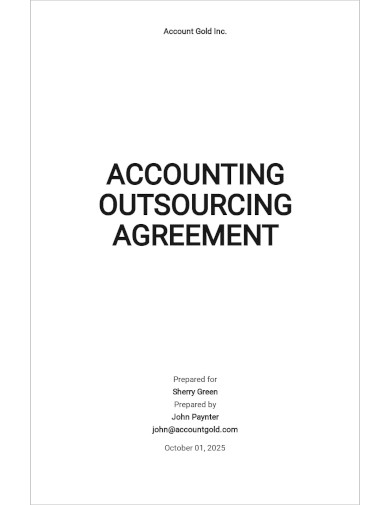
Accounting Outsourcing Agreement Template
download now -
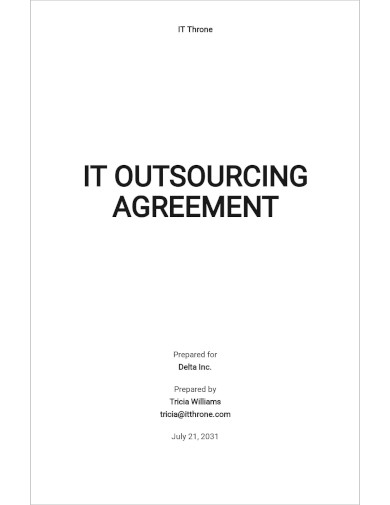
IT Outsourcing Agreement Template
download now -
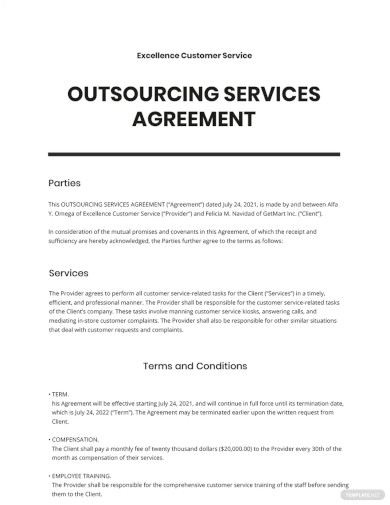
Outsourcing Services Agreement Template
download now -
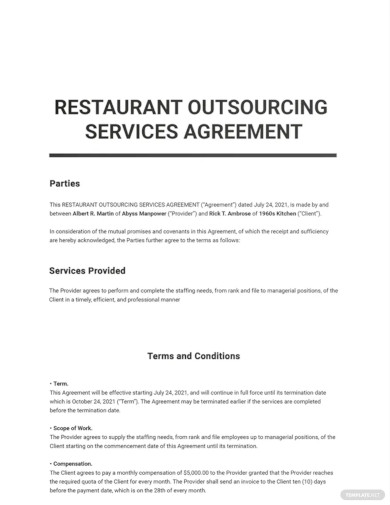
Restaurant Outsourcing Services Agreement Template
download now -
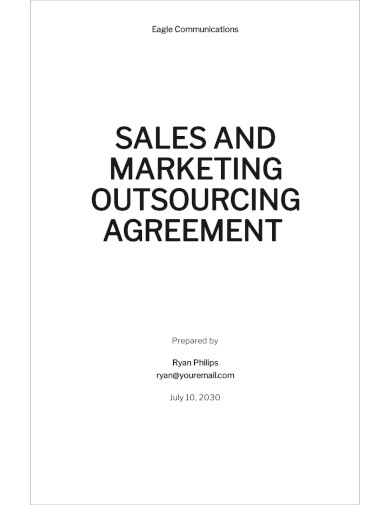
Sales and Marketing Outsourcing Agreement Template
download now -
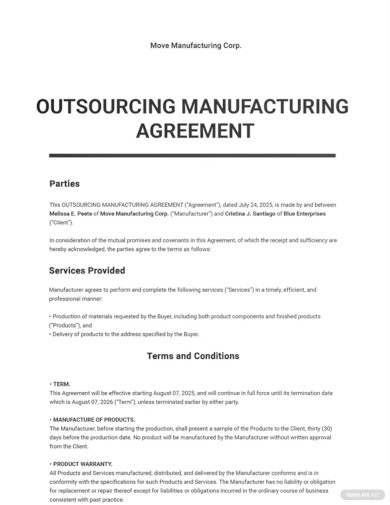
Outsourcing Manufacturing Agreement Template
download now -
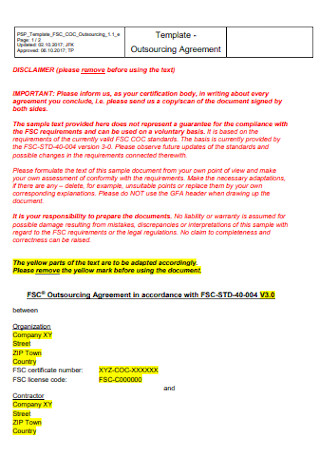
Sample Employee Outsourcing Agreement
download now -
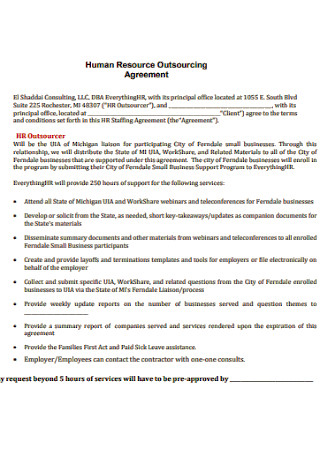
Human Resource Software Development Outsourcing Agreement
download now -
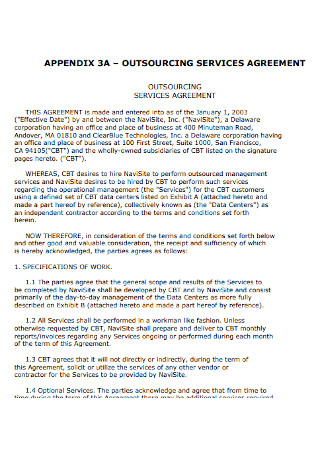
Outsourcing Manufacturing Service Agreement
download now -
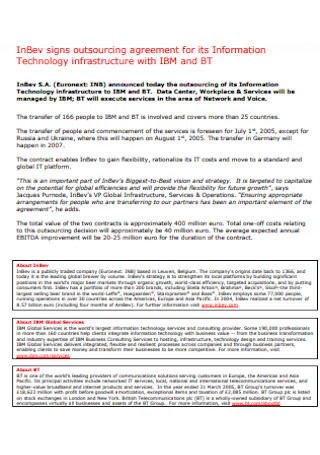
Simple Call Outstanding Agreement
download now -
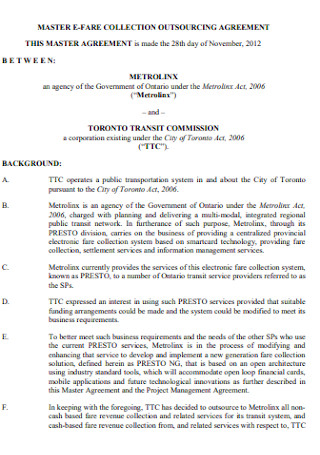
Master Fare Service Level Collection Outstanding Agreement
download now -
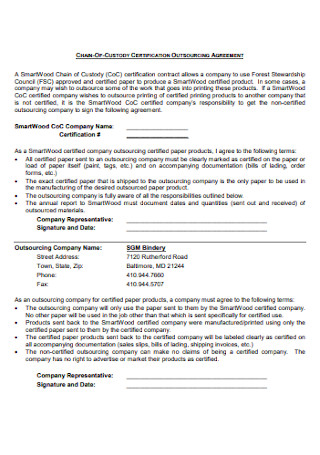
Vested Outstanding Agreement
download now -
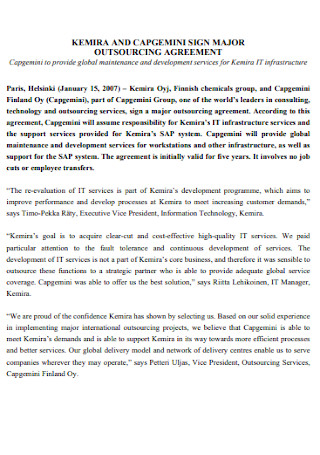
Major Outstanding Checklist Agreement
download now -
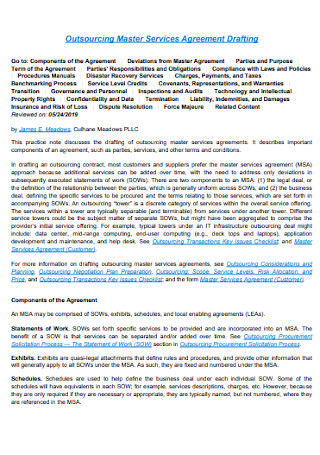
Outstanding Call Centre Master Service Agreement
download now -
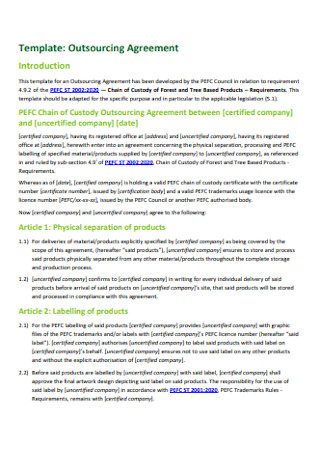
Outsourcing Process Outsourcing Agreement Format
download now -
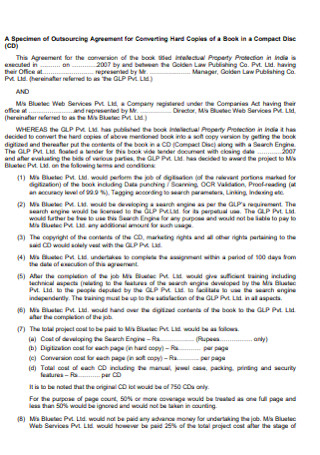
Specimen of Outsourcing Manufacturing Agreement
download now -
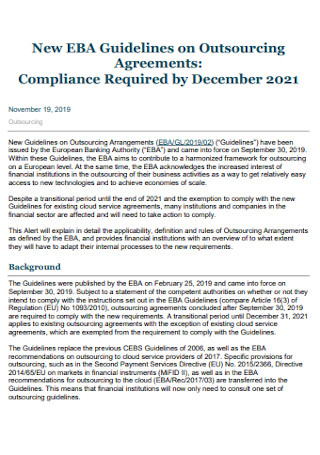
Standard Outsourcing Services Contract Agreement
download now
FREE Outsourcing Agreement s to Download
16+ Sample Outsourcing Agreements
What Is an Outsourcing Agreement?
Types of Outsourcing Agreements/Contracts
Key Things That Should Be Included In An Outsourcing Agreement
How to Determine if Outsourcing is the Right Move For Your Business
FAQs
Why is an outsourcing agreement needed?
What is the difference between outsourcing and insourcing?
Can outsourcing decrease employee morale?
How does outsourcing lower costs?
What Is an Outsourcing Agreement?
Before we define what an outsourcing agreement is, perhaps we should take a deep dive into the definition of outsourcing first. Outsourcing refers to the process of contracting with a third-party company to perform specialized work operations. Companies that make use of outsourcing can hire an outside company to assist with standard company operations such as inventory production or service completion on the company’s behalf. It could be a one-time task, such as filing taxes once a year, or a routine part of business operations, such as creating and maintaining social media accounts.
An outsourcing agreement is a legal document (contract) that is formed between a company and a service provider wherein the provider promises to deliver specified services. It will also serve as the foundation for the customer and supplier’s formal legal relationship. In comparison to other types of commercial contracts, they can be lengthy, complex, and cover a variety of issues that necessitate the advice of a specialist in areas such as data protection, pensions, and tax.
Types of Outsourcing Agreements/Contracts
Here are the different types of outsourcing agreements, all of which vary on the type of agreement that you enter with the outsourcing vendor:
- Time and Materials Agreement – This contract, which is one of the most common outsourcing agreements, specifies what you owe the outsourced team for their time and materials. In this context, time refers to the agreed-upon hourly rate for each team member, whereas materials refer to resources such as specific software equipment. If you have a long-term project that requires a lot of flexibility, you should choose this outsourcing contract. The duration of the contract ends when the goods/services are delivered in accordance with the specifications. As a result, it’s critical to set manageable Smart goals and review progress reports on a regular basis.
- Fixed Price Contract – This contract defines the scope of the project which is usually found in a Request for Proposal (RFP) document. When you accept the outsourcing company’s bid and agree on a fixed price, the contract begins. This contract, which is commonly used in IT outsourcing, does not provide much flexibility because the requirements of both parties are predefined. However, if the project scope statements changes, you must create a change order. Once both parties agree on the new effective date and compensation, the new terms should be incorporated into the existing contract.
- Dedicated Team Contract – You hire a dedicated remote team to act as an extension of your in-house team in this case. They work solely on your projects and can handle multiple tasks at the same time. Rather than being a simple give-and-take relationship, it focuses on business growth and the establishment of a long-term outsourcing relationship. This contract is ideal for projects that require continuous collaboration, such as web development, and does not typically include an exit strategy or clause.
Key Things That Should Be Included In An Outsourcing Agreement
Here are the key components that should be present in an outsourcing agreement:
How to Determine if Outsourcing is the Right Move For Your Business
Here are the steps in determining if your business has everything present and is a good fit to start outsourcing:
-
1. Determining the Core Functions
You can begin the decision-making process by describing the products and services in which your company specializes. It is critical to first analyze your company’s operations to determine which areas need to be more efficient. This can assist you in determining which business functions can be outsourced to help you narrow your focus and lower your overall costs.
-
2. Calculating the Department Costs
Many businesses choose to outsource in order to save money. Determine how smoothly each department runs, how much revenue each department generates, and the employee turnover rate within each department position. You can compare your budgets and actual costs once you’ve determined which departments aren’t related to your core functions. This can be used as a guide to determine which departments are affecting your profits and which can be outsourced.
-
3. Researching Different Companies
Once you’ve determined which departments and functions might benefit from outsourcing, look into companies that specialize in those tasks to see how much they charge and what services they provide. You should also inquire about their hiring practices, security policies, and contract terms, particularly what happens if they fail to meet quotas. You can also seek recommendations and reviews from your network and other companies in your industry.
-
4. Prioritizing Needs
You can use the results of your Company Research to narrow down the list to the most suitable companies for your company. You can also use them to determine how much money you should budget for outsourcing the business process. If you decide against outsourcing, you can use this data to determine how to streamline the department and focus its functions and employees to be more efficient and productive.
-
5. Determining the Effect on Employees
Outsourcing may be a purely financial decision, but it is important to consider how it will affect employee morale. Surveys and interviews can be used to determine how employees will respond. Many employees are more comfortable with a transition to outsourcing if their company is open about the process and their reasons for doing so. You should also consider what severance packages or reassignments you will provide to employees who may lose their roles as a result of outsourcing.
-
6. Looking at the Bigger Picture
You can determine if outsourcing is right for your company once you have compiled financial data on the business function, projected outsourcing costs, and potential impacts on your company culture. You can also hire consultants to assist you in determining whether outsourcing is a good idea for your company and how to make the transition as smooth as possible.
FAQs
Why is an outsourcing agreement needed?
If you have done your due diligence and determined that outsourcing is the best option for your business, then without a detailed outsourcing agreement in place, you will be handing over a function of your business with no contractual guarantees of service levels and the real risk to your business if the outsourcing arrangement isn’t fit for purpose and your business suffers as a result.
What is the difference between outsourcing and insourcing?
Outsourcing employs an outside organization’s developed workforce to perform tasks, as well as an outside organization’s resources for services and manufacturing products. Insourcing, on the other hand, assigns a project to a person or department within the company rather than hiring an outside person or company. It makes use of developed resources within the organization to complete tasks or achieve a goal.
Can outsourcing decrease employee morale?
Outsourcing may have an impact on your company culture, particularly employee morale. If your employees do not understand why outsourcing is necessary, they may believe they are being replaced. As workflows become more complicated, other employees may become frustrated, especially if the contracted company is in a different time zone.
How does outsourcing lower costs?
Outsourcing specific functions to other companies can help you reduce your company’s labor costs. The third-party organization hires the employees and is in charge of their pay, benefit packages, and training. This allows your company to concentrate its labor costs on its core employees. Outsourcing can also help you save money on equipment. Rather than purchasing new equipment, relocating, or changing processes, it may be more cost-effective to hire a third party.
When outsourcing to a third-party company, an effective and detailed outsourcing agreement should be in place with the service provider so that the risks that come with outsourcing are minimized. Having clear expectations and deliverables makes it easier for the parties involved in the outsourcing agreement to establish and maintain a professional relationship. In this article, examples of an effective outsourcing agreement are readily available for you to download and use as a reference.
